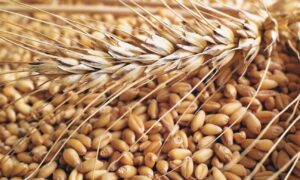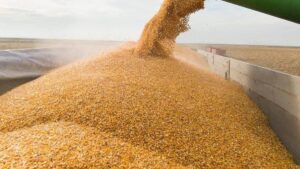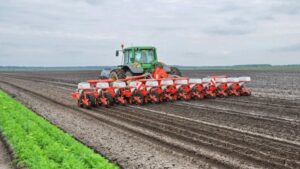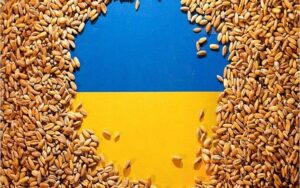
As of April 4, Ukraine sowed 926 thousand hectares of spring grains and legumes, up 8.7% year-on-year, and started sowing sunflower, the press service of the Ministry of Agrarian Policy and Food reported on Friday.
According to the report, 116.5 thousand hectares were planted with wheat (79.8 thousand hectares a week earlier), 551.8 thousand hectares with barley (315.5 thousand hectares), 164.3 thousand hectares with peas (102.9 thousand hectares), and 82.3 thousand hectares with oats (50.7 thousand hectares).
According to the Ministry of Agrarian Policy, Odesa region is the leader in terms of sowing rates, having sown spring crops on 92.3.1 thou hectares, Ternopil region – 87.4 thou hectares, Poltava region – 83.2 thou hectares, Mykolaiv region – 73.6 thou hectares, Vinnytsia region – 72.6 thou hectares.
In addition, 33 thou hectares have already been planted with sunflower, 64.8 thou hectares with sugar beet, and 2.6 thou hectares with soybeans.
The Ministry reminded that in general, in 2025, it is planned to plant more than 5.7 mln ha of spring grains and legumes, which corresponds to the level of 2024. The main feature of the new season will be an increase in the area under spring wheat by 28%, to 222.8 thou hectares. Such changes in the crop structure are in line with the stable demand from processing companies and exporters.
As reported, as of April 4, 2024, the total area under spring grains and pulses was 852.1 thsd ha. Peas were planted on 119.0 thou hectares, barley – on 543.2 thou hectares, wheat – on 118.3 thou hectares, oats – on 62.4 thou hectares.

As of March 28, Ukraine exported 32.389 mln tonnes of grains and pulses since the beginning of 2024-2025 marketing year (MY, July-June), of which 3.206 mln tonnes were shipped this month, the press service of the
Ministry of Agrarian Policy and Food reported citing the State Customs Service.
According to the report, as of the same date last year, the total shipments amounted to 34.199 mln tons, including 4.529 mln tons in March.
In terms of crops, since the beginning of the current season, Ukraine has exported 12.997 mln tons of wheat (994 thsd tonnes in March), 2.206 mln tons of barley (62 thsd tonnes), 10.8 thsd tonnes of rye (0), and 16.72 mln tons of corn (2.14 mln tonnes).
The total export of Ukrainian flour since the beginning of the season as of March 28 is estimated at 53.1 thsd tonnes (in March – 4.5 thsd tonnes), including 49.2 thsd tonnes of wheat (4.4 thsd tonnes).

As of March 26, Ukraine exported 32.214 mln tonnes of grains and pulses since the beginning of 2024-2025 marketing year, including 3.032 mln tonnes shipped since the beginning of the current month, the press service of the Ministry of Agrarian Policy and Food reported, citing the data of the State Customs Service.
According to the report, as of March 27 last year, the total shipments amounted to 34.199 mln tons, including 4.529 mln tons in March.
At the same time, since the beginning of the current season, Ukraine has exported 12.912 mln tonnes of wheat (13.504 mln tonnes in 2023/24 MY), 2.196 mln tonnes of barley (1.957 mln tonnes), 10.8 thsd tonnes of rye (1 thsd tonnes), and 16.621 mln tonnes of corn (18.447 mln tonnes).
The total export of Ukrainian flour since the beginning of the season as of March 26 is estimated at 52.8 thsd tonnes (in 2023/24 MY – 78.1 thsd tonnes), including 48.9 thsd tonnes of wheat (74 thsd tonnes).

As of March 24, Ukraine exported 31.736 mln tonnes of grains and pulses since the beginning of 2024/2025 marketing year (MY, July 2024 – June 2025), of which 2.553 mln tonnes were shipped this month, the press service of the Ministry of Agrarian Policy and Food reported, citing the data of the State Customs Service.
According to the report, as of March 27 last year, the total shipments amounted to 34.199 mln tons, including 4.529 mln tons in March.
At the same time, in terms of crops, since the beginning of the current season, as of March 24, 2025, wheat was exported – 12.798 mln tonnes (815 thsd tonnes in March), barley – 2.193 mln tonnes (49 thsd tonnes), rye – 10.8 thsd tonnes (0), corn – 16.26 mln tonnes (1.68 mln tonnes).
Total exports of Ukrainian flour in the period under review are estimated at 52.2 thsd tonnes (3.7 thsd tonnes in March), including 48.3 thsd tonnes of wheat (3.6 thsd tonnes).

As of March 20, Ukraine sowed 250.4 thousand hectares of spring grains and legumes in 19 regions, up 16.7% year-on-year, the press service of the Ministry of Agrarian Policy and Food reported on Friday.
According to the report, 36.7 thousand hectares were planted with wheat (12.9 thousand hectares a week earlier), 133.5 thousand hectares with barley (45.2 thousand hectares), 57 thousand hectares with peas (17.8 thousand hectares), and 16.9 thousand hectares with oats (7.2 thousand hectares).
Last week, Ukrainian farmers sowed grains and pulses on 167.4 thou hectares.
According to the Ministry of Agrarian Policy, the leading regions in terms of sowing are Mykolaiv, which sowed spring crops on 43 thou hectares, including 1.5 thou hectares of wheat, 22.5 thou hectares of barley, 18.7 thou hectares of peas and 0.3 thou hectares of oats; Ternopil – 6.4 thou hectares of wheat, 21.3 thou hectares of barley, 2.1 thou. hectares of peas, 1.5 thousand hectares of oats; Kirovograd – 0.9 thousand hectares of wheat, 14.5 thousand hectares of barley, 10.5 thousand hectares of peas; Vinnytsia – 5.6 thousand hectares of wheat, 12.3 thousand hectares of barley, 5.3 thousand hectares of peas, 0.9 thousand hectares of oats; Rivne – 0.5 thousand hectares of wheat, 10.7 thousand hectares of barley, 0.7 thousand hectares of peas, 3.3 thousand hectares of oats.
The Ministry reminded that in general, in 2025, it is planned to sow more than 5.7 million hectares of spring grains and legumes, which corresponds to the level of 2024. The main feature of the new season will be an increase in the area under spring wheat by 28%, to 222.8 thou hectares. Such changes in the crop structure correspond to the stable demand for wheat from processing companies and exporters.
As reported, as of March 21, 2024, Ukraine sowed 214.5 thsd ha of spring grains and pulses in 20 regions. Peas were sown on 53.1 thou hectares, barley on 117.3 thou hectares, wheat on 29 thou hectares, and oats on 10.6 thou hectares.

As of March 12, Ukraine exported 31.022 mln tonnes of grains and pulses since the beginning of 2024-2025 marketing year (July-June), of which 1.839 mln tonnes were shipped this month, the press service of the
Ministry of Agrarian Policy and Food reported, citing the data of the State Customs Service of Ukraine.
According to the report, as of March 20 last year, the total shipments amounted to 32.851 mln tons, including 3.181 mln tons in March.
In terms of crops, since the beginning of the current season, Ukraine has exported 12.509 million tons of wheat (526 thousand tons in March), 2.192 million tons of barley (48 thousand tons), 10.8 thousand tons of rye (0), and 15.839 million tons of corn (1.259 million tons).
The total export of Ukrainian flour since the beginning of the season as of March 17 is estimated at 51 thsd tonnes (2.5 thsd tonnes in March), including 47.1 thsd tonnes of wheat (2.4 thsd tonnes).